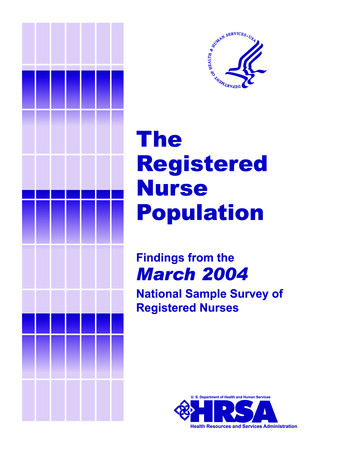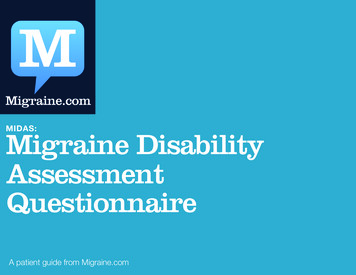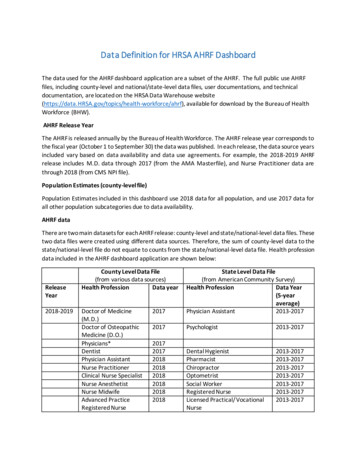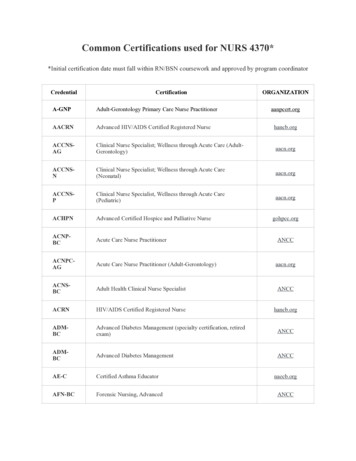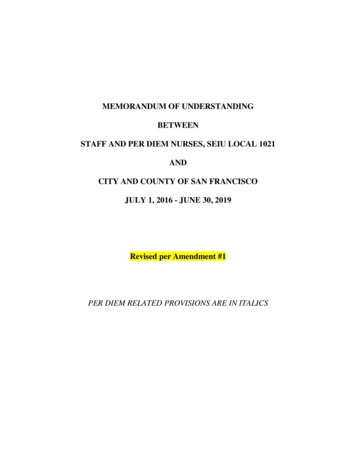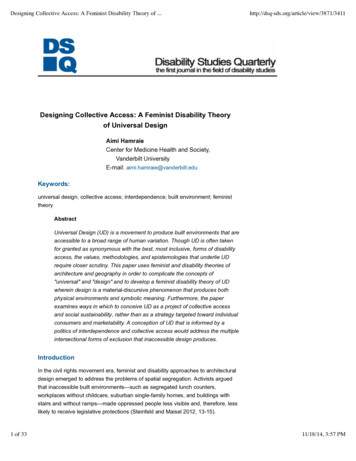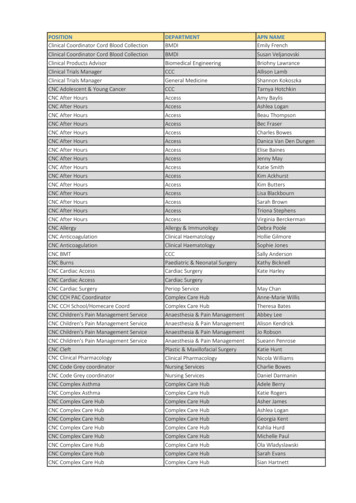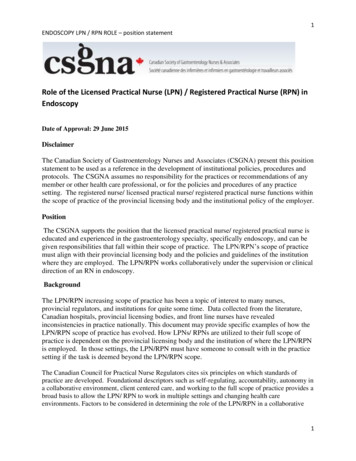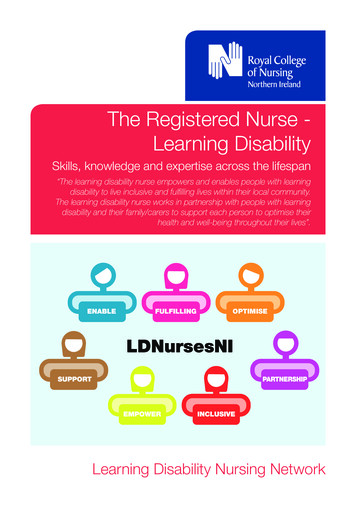
Transcription
The Registered Nurse Learning DisabilitySkills, knowledge and expertise across the lifespan“The learning disability nurse empowers and enables people with learningdisability to live inclusive and fulfilling lives within their local community.The learning disability nurse works in partnership with people with learningdisability and their family/carers to support each person to optimise theirhealth and well-being throughout their lives”.OPTIMISELearning Disability Nursing Network
A Registered Nurse – Learning DisabilityIs a member of the nursing profession who has a specialised and important role inthe lives of people with learning disability. The Registered Nurse - Learning Disabilitysupports the physical, mental, emotional, psychological, educational, spiritual andsocial needs of a person with learning disability, from early years to the end of life.“I have been a qualified RNLD for the past six years.I listen to people who some may think have no voice. I teachskills for life to individuals so their world is opened up to moreindependence and opportunities. I help people understandtheir health so they can take ownership of their choices. I workalongside parents, siblings and the multidisciplinary teamadvocating for the rights of individuals.Who am I?I am a proud RNLD.”Julie Ann Colvin, RNLDProfessionalism and the Registered Nurse Learning DisabilityAll registered nurses and midwives must act in line with the values and behavioursset out by their professional body, the Nursing and Midwifery Council in “The Code;professional standards of practice and behaviour for nurses and midwives” (2015).The Code contains a series of statements that taken together signify what goodnursing practice looks like.The Code sets out these statements under four themes: Prioritise People Practise Effectively Preserve Safety Promote Professionalism and TrustThe Registered Nurse - Learning Disability is committed to the embodiment ofthese behaviours, values and standards of practice. The Registered Nurse Learning Disability is competent, compassionate, caring, courageous, committed,and communicates with people with learning disability using a variety of methods,suitable to their individual needs.2The Registered Nurse Learning Disability works with people with learning disabilityin a diverse range of roles. This could include: neurodevelopmental assessment,diagnosis and intervention; nursing a person with complex physical needs;comprehensive mental health assessment and treatment; and, the provision ofguidance and support. All of this will enable a child, young person or adult withlearning disability to flourish and live a fulfilling life with the same rights, access tohealthcare, and opportunities as everyone.A key and essential role of the Registered Nurse Learning Disability is in theprovision of care and interventions that promote, sustain and maintain biological,psychological, and social well-being. In line with public health policy, the registerednurse learning disability focuses on early intervention and systemic healthimprovement approaches.The particular knowledge, skills and experiences of the Registered Nurse Learning Disability are transferable across the wide range of health and socialcare services used by the person with learning disability. This includes roles withinmanagement structures and nurse development functions. The Registered Nurse Learning Disability is also an important member of teams outside of traditional healthand social care settings and services, for example, education and university posts,and policy development and advisory roles.The Practice Education Team comprises nursesfrom across the specialities. My specific knowledge andexpertise as an RNLD ensures that the needs and experiences ofpeople with learning disability are rightfully recognised by mycolleagues as essential components of addressing thepractice development needs of nursing.Ian McKnight, RNLD, Specialist Practitioner in LearningDisabilities, Practice Education Facilitator3
The Registered Nurse - Learning Disability is:COMPETENTThe Registered Nurse - Learning Disability is:COMPASSIONATEThe Registered Nurse - Learning Disability:The Registered Nurse - Learning Disability: has an in-depth knowledge and understanding of the health needs of the personwith learning disability; sees the person and their likes, dislikes, wishes, personality and strengths first; recognises that the person could have additional and competing physical, emotional,social, and educational needs, due to the nature of their learning disability; can support people who present with a range of complex physical and mentalhealth needs, and who may experience a range of complex behaviours; assesses, plans, implements and evaluates individualised care using abiopsychosocial model, undertaking specialised assessments where required; delivers a variety of evidence based clinical interventions, using a range ofevidence based resources and tools.I am a RNLD and an Epilepsy Nurse Specialist for people with learningdisability. My knowledge and skills provide advanced monitoring andreview, addressing any epilepsy related concerns, promoting positiveoutcomes and ensuring a high standard of care is provided. has a real desire to always promote the rights of the people with learning disability; always considers others who are important in the person’s life; is kind, patient and understanding; embeds the core principles of Fairness, Respect, Equality, Dignity and Autonomyin their daily practice and leads others by example.My daughter has been availing of services for many years both as aninpatient and in the community. Since she was transferred to yourward, as a mother, I have had my first night’s sleep in many years.I now know my daughter is safe and is being well looked after bynurses who treat her like an individual and with compassion.RelativeSarah McCann, RNLD, Epilepsy Nurse SpecialistWe should all be working in evidence based ways, embracingnew and emerging evidence based interventions that informand improve the way RNLD care for adults, and children andyoung people with learning disability. Today we have a rangeof evidenced-based, therapeutic approaches, such as positivebehavioural support, which means that those in our care getthe help and support they need to live with their families andlocal communities and, like everyone else, only be admittedto hospital when necessary. This leads to better outcomesfor adults, children and young people, and their families, andgreater job satisfaction for staff.Siobhan Rogan, RNLD, Intellectual Disability CAMHSManager & Advanced Practitioner45
The Registered Nurse - Learning Disability is:CARINGThe Registered Nurse - Learning Disability is:COURAGEOUSThe Registered Nurse - Learning Disability:The Registered Nurse - Learning Disability: provides family centred care; always acts as an advocate; works in partnership with the person and those who are involved with them,to co-produce care and support plans that build on and retain strengthsand capabilities; will challenge others to ensure that the best interests of the person are provides care that addresses the physical, psychological, educational, socialand spiritual needs of the person; is always aware of the vulnerabilities that person may present with; provides care along life’s pathway and responds to changing needs atdifferent life stages; has the skills to support people who are in crisis; can respond quickly, effectively and compassionately when a person withparamount in all decision-making processes; will challenge health and social inequalities and discrimination.It is widely recognised that people with learning disability are at adisadvantage in life. First and foremost RNLDs see the person forwho they are, and not their disability. RNLDs show courage everydayby continually encouraging other people to see beyond the person’slearning disability. Day in and day out RNLDs strive to ensure peoplewith a learning disability are respected and treated as individuals andare given the same opportunities in life as everyone else.Barbara Tate, Team Leader/Specialist Practitioner/CNLDlearning disability experiences distress or complex behaviours.Nurses with a RNLD qualification and registration are unique in thattheir skills and knowledge are varied; we can ensure excellence incare from early years through to older adulthood and across a widerange of nursing and support needs. We have an extensive andholistic knowledge of the individual. We deliver care with empathy,positivity, and a focus on the person’s strengths and capabilities.Yvonne Diamond, RNLD, Home ManagerI hurt myself for years until I came to this ward.The nurses understand me and keep me safe.The nurses always invite me to come to my meetings.They make me feel important as I know that no changesever happen to my care without me being involved.Hospital patient67
The Registered Nurse - Learning Disability is:COMMITTEDThe Registered Nurse - Learning Disability has:Excellent COMMUNICATION SkillsThe Registered Nurse - Learning Disability:The Registered Nurse - Learning Disability: empowers and supports the person to achieve their full potential; is skilled and proficient at engaging with the people who have a range ensures the person is assisted to understand their care and support needs andnever makes assumptions around the person’s capacity or level of understanding; is committed to person centred care, and works in partnership with the person,their family, other professionals, agencies and the wider community; promotes independence and supports the person to independently improvetheir wellbeing.of communication needs; provides and advocates for the provision of reasonable adjustments in orderto support the person in decision making processes about their life, their careand treatment, and their support; is creative in using different methods of communication to promote health andwellbeing and to empower the person to live a healthy and fulfilling life.Leadership and patient centred care is integral to everything that I doin my job. Every day has many challenges but it’s the team of nursesaround me who continually inspire me to be a better leader. The teamnever fail to amaze me with their commitment to the patients; theirpractice and their approaches reach the pinnacle of patient centredcare. They are the reason I walk in through the door - together weachieve amazing things every day.Rhona Brennan, RNLD, Ward SisterThe RCN represents nurses and nursing, promotes excellence in practice andshapes health policies. Should you require any support in relation to theseguidelines please contact an RCN representative in your area.From their foundation in pre-registration nursing education throughRoyaltoCollegeof Nursingcontinuedprofessional education and development, the RNLD17 WindsorAvenueguides, instructs and assesses learners in achieving a standard ofBelfastBT9 6EEnecessary to care for people with learning disabilities inproficiencyTelephone: 028 9038 4600 all practice settingsFax: 028 9038 2188Peter Griffin, RNLD, Professional Lead,www.rcn.org.uk/northernirelandLearning Disability Nursing, Queen’s University, Belfast89
The Registered Nurse - Learning Disability:“Skills, knowledge & expertise across the lifespan”“I feel privileged to work with a team of registered nurses who have chosen, from theoutset of their careers, to dedicate their professional lives to working with individualswith Intellectual Disability. Their unique commitment, holistic approach and diverseskill set prepares these nurses to ensure that individuals with Intellectual Disability canbenefit from all aspects of 21st century health care and research.A good example is the delivery of mental health services to children and adolescentswith Intellectual Disability, where a typical day in the life of a RNLD might range from anarrow focus on submicroscopic genome changes to the broad horizons ofhuman rights legislation!More than ever, we need RNLD’s at the forefront of ensuring people with anIntellectual Disability have better, healthier lives.”Dr Heather HannaConsultant Child & Adolescent Psychiatrist in Intellectual DisabilitySarah McCain, Learning Disability Nurse of the Year 2017OPTIMISENetwork event 26th September 2017 - Members and Speakers10With thanks to Leah Kelly for the design of our logo11
The RCN represents nurses and nursing, promotesexcellence in practice and shapes health policies.Should you require any support please contact anRCN representative in your area.Royal College of Nursing17 Windsor AvenueBelfast BT9 6EETelephone: 028 9038 4600Fax: 028 9038 2188www.rcn.org.uk/northernireland
Network event 26th September 2017 - Members and Speakers With thanks to Leah Kelly for the design of our logo OPTIMISE. The RCN represents nurses and nursing, promotes . Should you require any support please contact an RCN representative in your area. Royal College of Nursing 17 Windsor Avenue Belfast BT9 6EE Telephone: 028 9038 4600 Fax: 028 .


